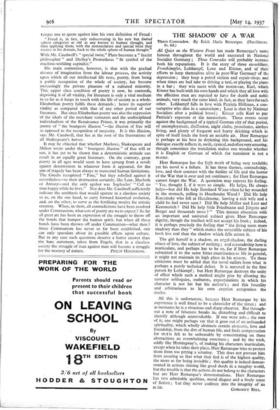THE SHADOW OF A WAR
-Three Comrades. -By Erich Maria Reaurque. (Huzchimaa 8s. 6d.)
All Quiet on the Western Front has made Remarque's name famous throughout the world and execrated in National Socialist Germany ; Three Comrades will probably increase both his reputations. It is the story of three ex-soldiers, Frontkdmpfer, Lohkampf, Lenz and Koster, and of their efforts to keep themselves alive in post-War Germany of the depression ; they keep a petrol station and repair-shop, and when times are bad take to driving a taxi, or playing the piano in a bar ; they win races with the motor-car, Karl, which KOster has built with his own hands and which they all love with the affection men are reputed to have for dumb and noble animals, very much the same kind, in fact, as they have for each other. Lohkampf falls in love with Patricia Millman, a con- sumptive who dies in a sanatorium ; Lenz is shot by National Socialists after a political brawl ; Koster sells Karl to pay Patricia's expenses at the sanatorium. These events occur against the background of a typical German city of that period, of unemployment, disillusion, night clubs, prostitutes, aimless living, and plenty of frequent and heavy drinking which in spite of itself lends the book an amiable air. Herr Remarque is perhaps at his best in depicting this background, and his dialogue exactly reflects it, swift, cynical, and often very amusing, though sometimes the translation makes one wonder whether it is English or German of which the translator is not a master.
Herr Remarque has the high merit of being very readable; yet his novel is a failure. It has three themes, comradeship, love, and their contrast with the futility of life and the horror of the War that is over and yet continues ; for Herr Rcmarque cannot forget the War. A quotation may express his feeling. " Yes, thought I, if it were so simple. He helps, He always helps—but did He help Bernhard Wiese when he lay wounded in the stomach, yelling in Houthoulet Wood ? Did He help Katczinsky who fell at Handzaeme, leaving a sick wife and a child he had never seen ? Did He help Muller and Leer and Kenunerich ? Did He help little Friedmann and jiirgens and Berger and thousands more ? " This intense obsession with an important and universal subject gives Herr Remarque dignity, though the intellect will not accept his book ; indeed, it is perhaps precisely the feeling that " the living seem more shadowy than they " which makes the ostensible subject of his book less real than the shadow which falls across it.
The girl herself is a shadow, an angel-shadow, the darling object of love, the subject of nothing ; and comradeship here is inarticulate, and perhaps has to be so, for if Herr Remarque submitted it to the same bitter examination as life in general, it might not maintain its high place in his esteem. To these criticisms must be added that the novel suffers from what is perhaps a purely technical defect. It is narrated in the first person by Lohkampf ; but Herr Remarque destroys the unity of effect which such a method might give by allowing the narrator soliloquies, outbursts, expostulations in which his character is not his but his author's ; and this brutality and arbitrariness to his own creation antagonises the
reader. - All this is unfortunate, because Herr Remarque by his experience is well fitted to be a chronicler of the times ; and
at moments he is a vivacious and sharp observer. But through- out a note of falseness breaks in, disturbing and difficult to identify although unmistakable. If one were aske.1 the root of it, one might perhaps say that it grew out of an unfounded spirituality, which wholly abstracts certain elements, love and friendship, from the dirt of human life, and finds compensation for tritis felt to be unbearable by concentrating on these abstractions an overwhelming sweetness ; and by the trick, oddly like Hemingway's, of making his characters inarticulate, except when he takes their place, Herr Remarque tries to protect them from too prying a scrutiny. This does not prevent him from assuring us that what they feel is of the highest quality, the more so for being invisible ; this quality is indeed demon- strated in actions shining like good deeds in a naughty world, but the trouble is that the actions do not belong to the characters but are Herr Remarque's demonstrations. Herr Remarque has two admirable qualities, moral disgust and a lively sense of fictiod ; tut they never coalesce into the integrity of an atist.
GORONWY REES.














































 Previous page
Previous page